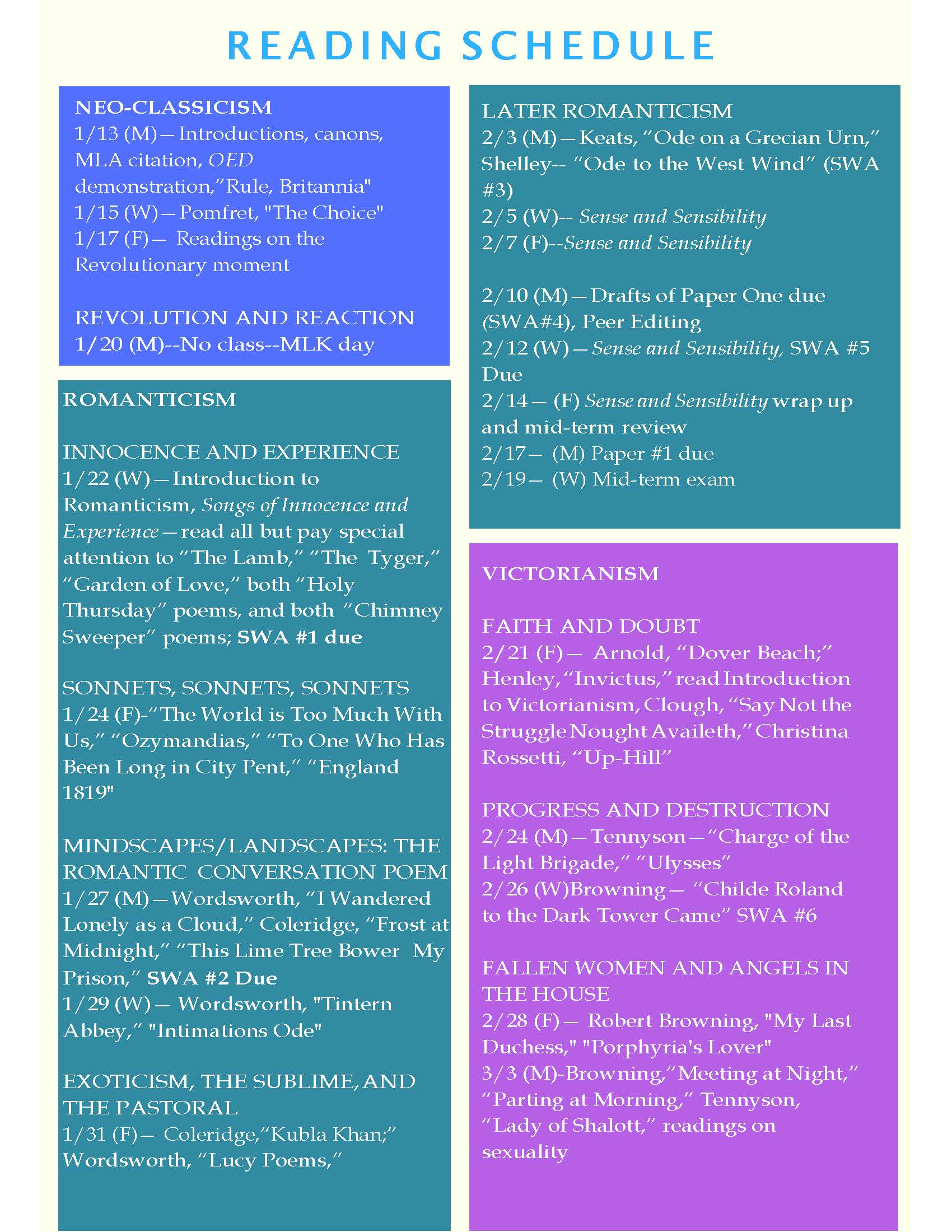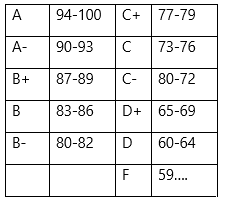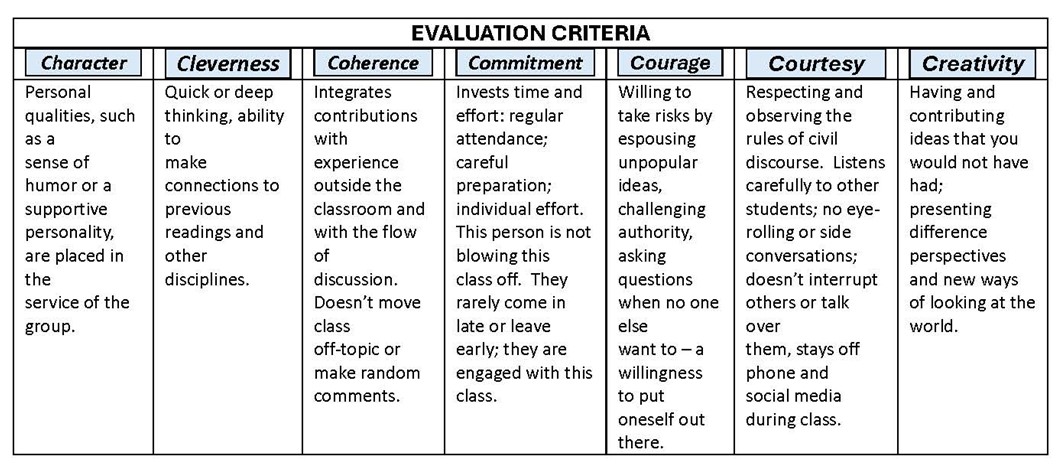EN245G:
Meeting Times, Location, & Course Delivery Details
Contact Information
Upon successful completion of the course...
Textbooks:
Sense & Sensibility, Jane Austen
Jane Eyre, Charlotte Bronte
Mrs. Dalloway, Virginia Woolf
Wide Sargasso Sea, Jean Rhys
Additional: Three ring binder, colored pencils or pens
- To foster critical thinking, reading, and writing skills
- To develop more advance skills in literary and cultural analysis
- To develop skills in analyzing, reading, speaking, and understanding poetry
- To introduce students to the British literary tradition, specifically the literature of the Romantic, Victorian, Modern, and Post-modern periods.
G CLASS
With reference to Wilmington College’ s mission, vision, core values, and queries, students will
- develop knowledge of the perspectives of cultures other than their own
- develop knowledge of global issues, especially as they relate to peace, social justice, and/ or ecology
- reflect upon the interconnectedness of world and their own roles as engaged members of a global community
WRITING SKILL DEVELOPMENT
In order to practice and develop writing skills, you will complete two major essays, short writing assignments,
and some occasional in- class writing. We will discuss what makes a good paper, and I will hold individual
conferences in my office with students before papers are due.
Tentative Schedule AND Course Assignments: Subject to change during the semester. Adequate notice of changes will be given.


See course schedule above.
Blackboard help: I f you are experiencing difficulty using Blackboard, accessing content, submitting assignments, taking assessments, participating in discussion boards, viewing your grade, or using your technology device, you should contact the IT Helpdesk at
helpdesk@ wilmington. edu or call 937 - 481 - 2459 .
Communicating with Faculty: I will answer student emails within 24 hours Monday-
Friday. Emails submitted over the weekend and/ or holidays will be responded on the f irst business day of the week. The best way to reach me is at laura_ struve@ wilmington. edu or by text at 937 - 527 - 9117 .
Student Email Etiquette and Guidelines:
Students are expected to respond to email within 24 hours Monday- Friday. Emails received over the weekend and/ or holidays should be responded to on the first business day of the week. Students should use their college email address.
You should think about your email as a chance to show your instructor that you care about the class. Keep your tone
friendly and respectful, and keep your emails concise and to the point. Make sure that you actually need to send the
email in the f irst place. Sometimes, simply reading through your syllabus, assignment description, class website,
or lecture notes can answer many of the questions you might have.
The grading scale will be as follows:
 |  |
WHAT IF I TURN IN WORK LATE?
Late writing assignments will be penalized by lowering the grade 10 points. Papers must be typed and proof- read, and they should be uploaded to Blackboard on the day indicated.
Please use MLA format to document all sources. It is also a requirement of this class that you back up all of your computer files. This will ensure that you never have any serious problems with missing work.


Peer Evaluation of Class Participation
College courses are increasingly seen as an opportunity for students to apply the tools and content of the curriculum collaboratively. In this learning environment, students teach each other, and a grade (to be fair, and to send the right signals) must reflect their success at doing this. However, some students believe that flattering the instructor will be good for them, and participation in class discussion repeats or reflects what the instructor has said. Even the best students in class discussion may direct their comments to the instructor rather than a conversation held by the group. I also believe the grade for class participation should reflect students' contribution to the learning of others.
What Does This Look Like In Practice?
Twice during the semester and a third time at the end, I will circulate a survey about class participation. You will record a score for other students AND yourself. A few wise guys give everyone the same grade: I discard their scores as uninformative (which costs them their own score.) I average the scores and excerpts the comments. The first two rounds of this survey don't count and are purely informational; the last one counts.

Instructor Course Policies
ATTENDANCE IN PHYSICAL CLASS
If you are sick or feel like you may have COVID symptoms, you will be excused. You SHOULD NOT come to class if you feel sick. Should any student feel ill at any time during the semester it is important to contact the college nurse (wchealthcenter@wilmington.edu , 937-481-2217) immediately. She will determine if testing, isolation, or quarantine are necessary. If the nurse, or some other health authority, indicates the need to isolate or quarantine,
your faculty will be notified through the Office of Academic Affairs of the dates of excused absences, once confirmed by the school nurse. It is, however, YOUR RESPONSIBILITY to contact your professors immediately in order to determine how best to maintain engagement with course content and assignments during your absence.
We've all been in Zoom classes by now and know how difficult that can make participation. If it is at all possible, you should come to physical class. If you are on Zoom, I expect you to participate in discussion and keep your camera on if at all possible. It should be noted that simply logging into the course does not constitute attendance (I've had plenty of students in the Zoom room who do not answer when called upon!). If I call on you in class and you do not answer, I will count you as absent that day. Every student will have 1 Zoom pass if they need to Zoom into class for personal reasons. Ask me for the Zoom link when you need it.
I also need 24 hours' notice in order to Zoom you into class because Radiant technology may not be available, and I will
need to bring my laptop from home.
Participation Grade--Participation is 15% of this class. 5% of that will be your attendance, and 10% will be the evaluation of your comments in class discussion. See the next page for a more detailed explanation of how participation in discussion will be handled for this class.
See the institutions Academic Integrity Policy below.
There are many university, college and private websites students may consult about how to avoid plagiarism. Sites with particularly helpful suggestions can be found at:
http:// owl. english. purdue. edu/ owl/ resource/ 589 / 01 /
http:// www. indiana. edu/~ wts/ pamphlets/ plagiarism. shtml
http:// www. writing. utoronto. ca/ advice/ using- sources/ how- not- to-plagiarize
http:// www. princeton. edu/ pr/ pub/ integrity/ 08 / intro/ index. htm
http:// www. plagiarism. org/ plag_ article_ preventing_ plagiarism_ when_ writing. html
Institutional and Program-Level Policies
All exams will follow the Final Exam Schedule. Students scheduled to take three or more final examinations on one day may request to arrange their examination schedule, so no more than two exams occur on one day.
Requests for early or late exams are considered only under extreme circumstances. Prior to the exam period, the student must file a written request on the Early/Late Exam Form available in the Student One Stop Center, Academic Records, and on the WC portal. The form must be signed by the Instructor and the Academic Dean, approving the alternate exam time. This process must be completed prior to the scheduled exam period.
Undergraduate: SP25 Final Exam Schedule Graduate:
Out-of-class Work Expectation A minimum of 2 hours of out-of-class student work is expected for each hour of in-class time for traditional face-to-face courses. For online and hybrid courses, the combination of face-to-face time and out-of-class work should be equal to 3 hours per credit hour per week. |
Instructional Course Delivery |
Academic Integrity Policy The use of generative AI is prohibited except where expressly allowed in assignment instructions. |
Class Attendance Policy |
Accessibility and Disability Services
Accessibility and Disability Services
Wilmington College provides accommodations and services for student with a variety of disabilities, including chronic illnesses, psychological, physical, medical, learning, and sensory disability amongst others. If you anticipate or experience barriers based on disability and feel you may need a reasonable accommodation to fulfill the essential functions of this course, you are encouraged to contact:
Spencer Izor, Associate Vice President of Compliance - Title IX/ADA Coordinator at spencer.izor@wilmington.edu or 937-481-2365 or Nathan Flack, Academic Resource Manager at 937-481-2208 to learn more about the process and procedures for requesting accommodations, or by visiting College Hall Room 306a or the Robinson Communication Center, Room 103.
Religious Accommodations
Wilmington College strives for an inclusive climate and welcomes students from all backgrounds, faiths, and experiences. If religious observance impedes your ability to participate fully in classroom activities or a principal holiday from your religious tradition occurs during the semester and conflicts with class meetings or activities, please make the professor aware of this immediately to determine if a reasonable accommodation is possible.
